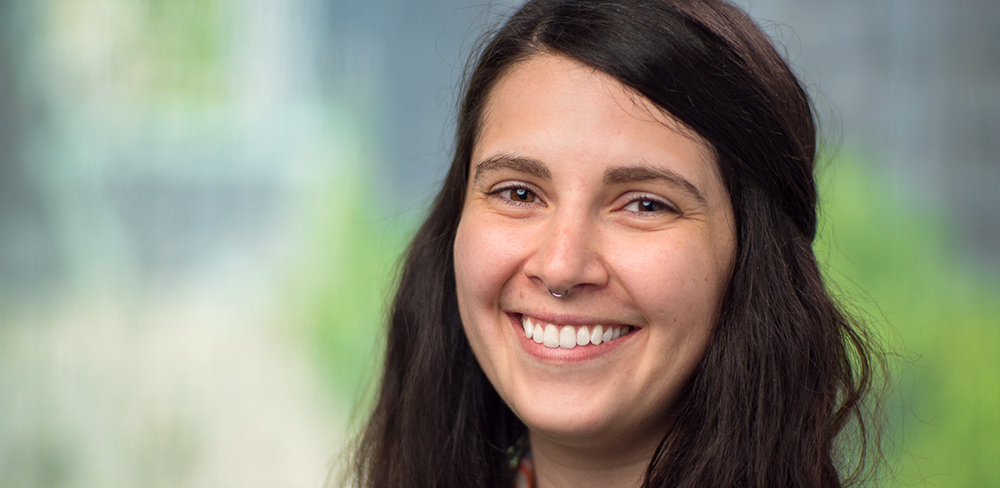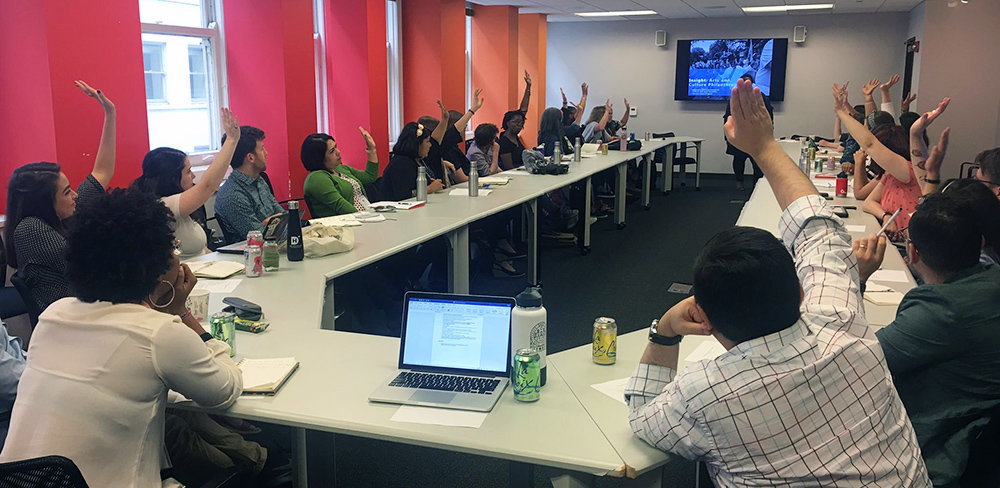By Liz Crisenbery, PhD Candidate in Musicology

As a PhD candidate with aspirations to find a career outside of the tenure-track professorship, looking at nonacademic job postings used to generate anxiety and tension. I frequently wondered: Could I do this job?
In other words, have I gained the requisite skills during my time in graduate school to be a viable candidate for other types of careers?
Before this summer, it wasn’t a question I was well-equipped to answer.
The prevailing assumption for PhD students in my field of musicology and across the humanities in general is that everyone wants to be a tenure-track professor. If that goal doesn’t materialize after a few times on the job market, a person might be stuck in the precarity of adjuncting or even try an ill-defined Plan B. While the culture is slowly changing across higher education (thanks in part to career diversity initiatives funded by organizations such as Mellon and the National Endowment for the Humanities), placing nonfaculty careers on equal footing with tenure-track faculty positions is far from the norm in many PhD programs. For doctoral candidates who do not aspire to be on the tenure track, challenging this norm can feel like a radical act. We don’t think of our nonfaculty aspirations as Plan B, yet this is how academic colleagues within our programs and across the academy may interpret them.
This summer I was a fellow at the Andrew W. Mellon Foundation-funded Humanities Without Walls Pre-Doctoral Career Diversity Summer Workshop, a three-week intensive workshop held in Chicago for humanities PhD students interested in exploring a variety of career options. I applied to the HWW Career Diversity Workshop to seek advice about how to find, apply for, and negotiate careers other than the tenure track. I hoped to gain concrete tools, networks, and support as I entered my final year of my PhD and went on the job market.
During the third day of the HWW workshop, I participated in a session on Skills, Values, and Mindsets run by Derek Attig from the University of Illinois at Urbana-Champaign and Mearah Quinn-Brauner from Emory University. It fundamentally challenged my approach to the job market. Although skills (could I do this job?) are one component of looking for and applying to jobs, values are equally important. We received small decks of cards with different values and had to place the values into three categories: needs, wants, and nonessentials. After categorizing the thirty-odd cards, we were instructed to whittle down our needs pile to five values. Painstakingly, I chose my top five values: creativity, location, stability and security, financial prosperity, and personal life.

Values exercise
An online version of the values exercise
The values exercise led to another simple question: Is this a job I want to do?
I had been so focused on identifying my skills that I neglected to consider what I really wanted out of a job and how that job might fit into the other parts of my life. I was empowered by this question and felt like I was reclaiming some agency by choosing the careers I want to pursue. In an age where we PhD students are constantly reminded about the precarity of the job market and a lack of jobs for newly-minted PhDs, there is an undeniable instinct to accept the first job offer (if a job is offered at all). So, in a deliberate effort to resist this instinct as I go onto the job market this year, I want to be thoughtful about my job search and reflect: Is this a job I want to do?
But having clarification about your values isn’t everything. Our paths are rarely linear.
I heard various iterations of this same phrase from the speakers at the HWW Career Diversity Workshop. It was at once frustrating and comforting to hear there is not a secret recipe to success—everyone has individual experiences, skills, and networks that cannot be easily replicated. This realization clashed with my deep-seated instinct to plan my future, instead persuading me to be more open about the paths I might take and to be okay with the unknown.
As I learned at the HWW Career Diversity Workshop, humanities PhDs are valued in numerous careers inside and outside of academia. If you are interested in hearing about other types of jobs, ask those who have been in your position as a job-seeking graduate student! Informational interviews are invaluable for learning more about the careers you might want to pursue and those which you are not interested in. Both outcomes are equally valuable and bring you one step closer to whatever path you take, linear or otherwise.
Reframing my career search around my personal values and understanding that there’s no singular route to success are steps I’m taking to empower myself during a precarious time in my adult life. As I learned during the HWW Career Diversity Workshop, these positionalities can be powerful when experienced with a group of open-minded peers.
The workshop provided the support for my cohort of thirty humanities PhD students from across the country to discover and discuss a multitude of career options without judgement. Having a space to talk freely about what we want to do with our lives after graduate school was refreshing and constructive. Throughout the three weeks, we learned about a variety of career options, heard career stories from numerous speakers, received advice on crafting competitive job applications, and conducted informational interviews. We also thought about how we might bring this career diversity knowledge back to our respective universities. To this end, I want to create a supportive, student-facilitated space for PhD students at Duke to talk about potential careers, share updates on job searches, and pool collective resources. Such a space would add to the existing professional development initiatives within departments and The Graduate School and encourage dialogue among PhD students whose paths might not have otherwise crossed.
If this resonates with you or your colleagues, let’s create such a space together. Email me if you want to be part of the conversation or if you’re curious to learn more.

“How many of you are seeking to explore careers beyond the academy?” HWW 2019 cohort
